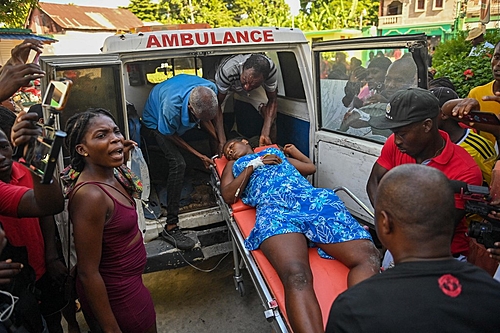
The Dominican Republic closed its border with Haiti for an indefinite period, increasing the isolation of the neighboring country, which is experiencing a serious humanitarian crisis. Armed gangs already control most of the capital Port-au-Prince, a situation that leads many Haitians to try to leave the country.
The Dominican government claims that it made this decision because it disagreed with a plan to divert water from a common river, called Massacre, which would violate the border agreement. It is a private project, which does not have approval from the Haitian authorities and would aim to sell water to farmers. Haiti accuses the decision of being unilateral, as the two countries have talked about the conflict and sought solutions.
The Dominican Republic last closed its border with the neighboring country following the assassination of Haitian President Jovenel Moïse in 2021. Since then, Dominican President Luis Abinader has occasionally blocked parts of the border and started building a wall between the two countries.
:: Brazilian government must develop ‘new cooperation’ with Haiti, says Haitian leadership ::
With the support of part of the population, the Dominican government adopts a low tolerance policy against Haitian immigrants, who arrive at a volume of 250 to 300 per day, according to estimates by local NGOs. Last Monday (11), the issuance of visas to Haitians was suspended.
According to UN experts, pregnant and postpartum women seeking medical care in the Dominican Republic were arrested while undergoing examinations and deported. In addition to basic services, such as healthcare, Haitians cross the border in search of flights, as few depart from Haiti.
Woman injured by gunshots awaits treatment in hospital in Haiti: many Haitian women have sought care in the Dominican Republic, where they are deported / Richard PIERRIN / AFP – 9/14/2023
“The Republic of Haiti has sovereignty over the exploitation of its natural resources. Just like the Dominican Republic, with which it shares the Massacre River, it has the full right to abstract (water withdrawals) there, in accordance with the agreement ( bilateral) of 1929. The government of the Republic of Haiti will take all necessary measures to protect the interests of the Haitian people,” the Haitian government said in a statement.

History and discrimination
For months, the Dominican Republic has been trying to prevent the migration of Haitians. In fact, the country’s position in Caricom (Common Market and Caribbean Community) is that “the United States and other powers should intervene in Haiti”.
The relationship between neighbors has always been turbulent. There is strong discrimination on the part of a portion of Dominicans, which creates fertile ground for propaganda that says “Haiti invades the Dominican Republic.”
Rafael Trujillo’s dictatorship in the Dominican Republic (1930-1961) was always against Haiti. In 1937, he organized a massacre against Haitians and all black people who looked like Haitians, claiming there was a danger of the Dominican Republic becoming “Haitianized.” Hate groups against Haitians formed at the time.
In 2015, the Dominican government, then under the command of Danilo Medina (2012-2020), claimed that Haitians were entering the Dominican Republic “as if they were in their own home”.
Cuba
The closed border for Haitians is expected to spill over into Cuba, where there is a large Haitian community, which has been growing in recent years, as the crisis worsens. In general, Haitians are well received, including as a potential workforce. However, Cuba has difficulty managing the flow of people, a consequence of the country’s economic crisis.
Although Cuba maintains a policy of “sharing what it has and not just what is left over”, the country has faced energy crises and difficulties in supplying basic necessities.
(With information from Folha de S.Paulo)
Editing: Thales Schmidt
Source: www.brasildefato.com.br

